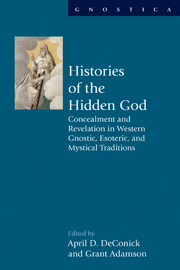 Histories of the Hidden God
Histories of the Hidden God Book contents
- Frontmatter
- Contents
- Acknowledgments
- Contributors
- Introduction: In search of the hidden God
- Part I Concealment of the Hidden God
- Part II The Human Quest for the Hidden God
- Part III Revelations of the Hidden God
- Afterword: Mysticism, Gnosticism, and esotericism as entangled discourses
- Bibliography
- Index
Afterword: Mysticism, Gnosticism, and esotericism as entangled discourses
- Frontmatter
- Contents
- Acknowledgments
- Contributors
- Introduction: In search of the hidden God
- Part I Concealment of the Hidden God
- Part II The Human Quest for the Hidden God
- Part III Revelations of the Hidden God
- Afterword: Mysticism, Gnosticism, and esotericism as entangled discourses
- Bibliography
- Index
Summary
The quest for the hidden god in Judaism, Christianity, and Islam is as old as the blending of philosophical and religious perspectives in the ancient Mediterranean. This volume on Histories of the Hidden God impressively shows that the dialectic of concealment and revelation of divine secrets has been an influential structural characteristic of Western religious tradition. Knowledge about the nature of the divine has always been linked to dangers and risks – but the higher the risk, the higher the prospective reward, one might say. Among the perceived dangers was the transgressive potential of this knowledge that ultimately put the human being in the position of the god. This was at the same time an important promise for the seekers themselves, along with the promise of salvation through gnosis.
It would be a futile attempt to provide a response to the many chapters of this volume. With its broad spectrum of approaches, topics and contents, esotericism, and mysticism in Western culture; however, it also reveals the difficulty of finding a coherent analytical framework for scholarly interpretation. How can we differentiate Gnostic, esoteric, and mystical currents? How do these currents become “-isms”? And what is gained by constructing such “-isms” in scholarly discussion? Do these terms help us explaining cultural dynamics, and if so, what kind of dynamics are we dealing with?
- Type
- Chapter
- Information
- Histories of the Hidden GodConcealment and Revelation in Western Gnostic, Esoteric, and Mystical Traditions, pp. 312 - 319Publisher: Acumen PublishingPrint publication year: 2013


